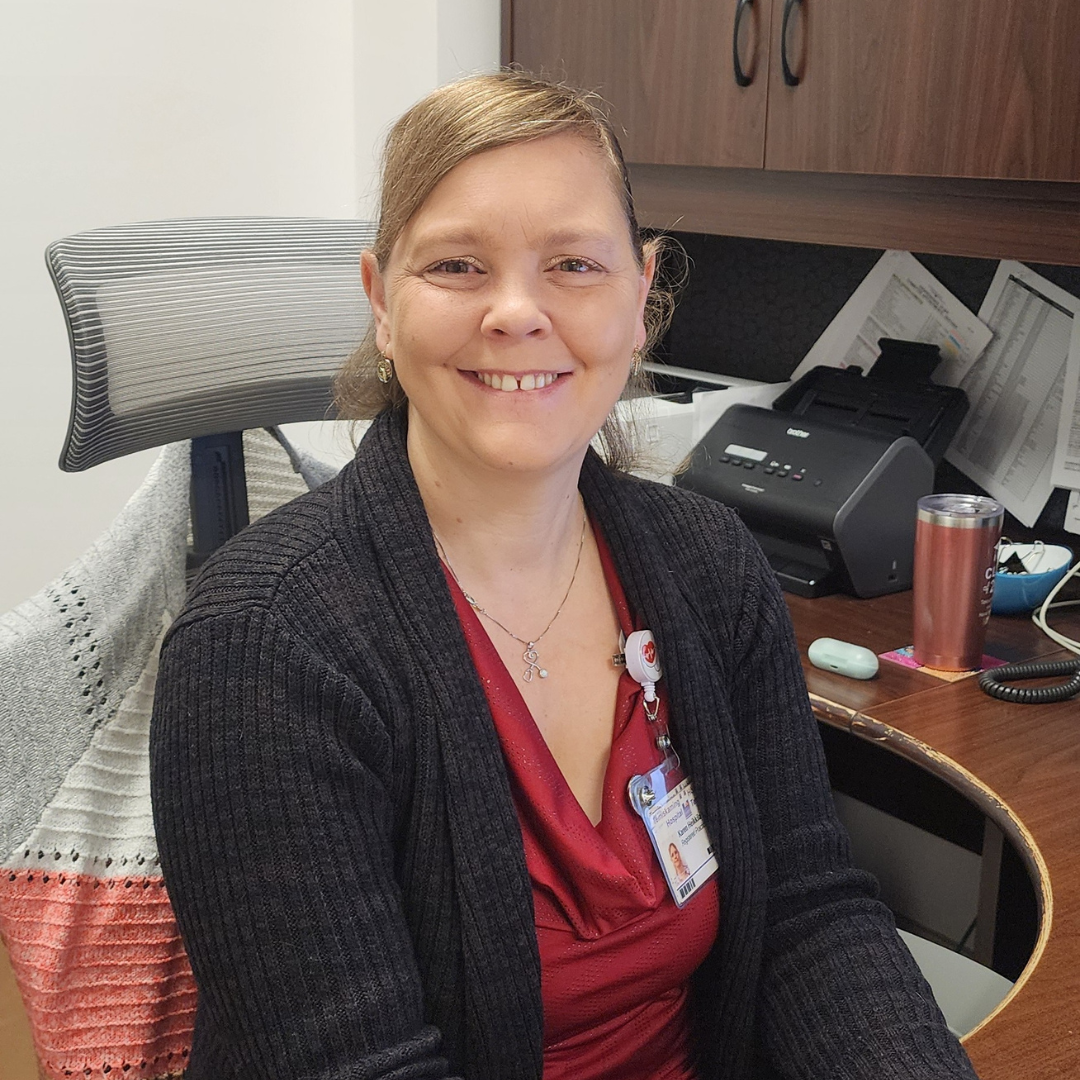When Temiskaming Hospital in Northern Ontario began its transition to the electronic health record system Meditech Expanse, Registered Practical Nurse (RPN) Karen Heikkila saw both a challenge and an opportunity. Today, as Clinical Informatics Specialist, she’s helping redefine what’s possible for RPNs in health-care technology—bridging the worlds of clinical practice and information systems to make care safer, smarter, and more connected.
Karen’s journey to nursing was anything but traditional. Originally from St. Catharines, she began her career as a veterinary technician, drawn to the sciences but uncertain about working directly with people. Everything changed when her son was born twelve weeks early and spent thirteen weeks in the neonatal intensive care unit. Witnessing the precision and compassion of the nurses who cared for him reshaped her understanding of the profession. “I just wanted to learn everything,” she recalls. “I wanted to know every procedure, every medication, and why things were done the way they were. It opened my eyes to what nursing truly is.”
That experience inspired Karen to pursue nursing at Northern College, where she graduated in 2017. After completing her preceptorship at Temiskaming Hospital, she joined the emergency department, where she quickly discovered her passion for collaboration. “I started working in the emergency department, and I just fell in love with team nursing, because it’s a different atmosphere—you’re not just focused on your own patient load; you help everybody. You work hand-in-hand with physicians, allied health, social workers, and community services. I really liked that.”
Her interest in systems, structure, and education soon intersected with her hospital’s plans to adopt a new digital record system—a massive, two-year transformation that touched every department. When the opportunity arose to become a Clinical Informatics Specialist, Karen stepped forward, despite being the first RPN to take on the position. “I really liked this role, and it wasn’t one that we had before, so the fact that I, as a Practical Nurse, was the first one who did it—and was able to show that RPNs can do this—meant a lot. We can train people; I trained physicians, nurses, and allied health, and did change management.”
As the bridge between the IT and clinical teams, Karen helped lead the rollout of Meditech Expanse, ensuring a smooth transition from paper to digital documentation. She trained multidisciplinary teams, guided them through new workflows, and made sure patient care stayed at the center of the process. Her nursing background gave her a vital perspective: understanding how technology affects care delivery at the bedside.
Moving into a leadership role traditionally reserved for professionals with management or IT degrees wasn’t without challenges. “There’s still a culture in some places where RPNs are expected to work under RNs,” she explains. In her current position, she reports to an IT manager rather than a clinical one—an arrangement that reflects the evolving nature of leadership in health care. Having built strong relationships throughout the hospital helped ease the transition, but she admits that offering technical guidance to staff with advanced degrees required confidence and humility.
The Meditech Expanse project demanded extensive planning and collaboration. Every team member had to understand their role before the launch date, and when the system finally went live, the hospital experienced only minor issues. For Karen, the most rewarding part was seeing the new system enhance patient safety and efficiency—proof that thoughtful digital transformation benefits everyone involved.
As technology continues to reshape care delivery, Karen stays adaptable through continuous learning. After completing her Bachelor of Science in Nursing, she enrolled in an informatics course that deepened her understanding of privacy, ethics, and the legal dimensions of health records. “I love that there’s a conversation that RPNs can be a part of,” she says. “Leadership is something that you learn; there are so many transferable skills—everybody has a history outside of nursing that contributes to how they communicate with others.”
Karen is also passionate about empowering other RPNs to explore non-traditional paths. “All nurses are leaders and trainers, and we all train each other, so I think we all have the skills—it’s just having the confidence to lead and train other people,” she says. Her advice to fellow RPNs is simple but powerful: “You don’t know until you’ve tried, so look for challenges. I think a lot of nurses get bogged down with day-to-day tasks and might not see other opportunities. So look for opportunities in your hospital that are not the typical ones, and if there are new opportunities, ask why it can’t be an RPN.”
Looking ahead, Karen envisions a health-care system where RPNs continue to drive innovation in technology and leadership. “I hope that technology becomes even more integrated in our everyday nursing lives and that RPNs are leaders in that change,” she says. “RPNs have a lot of experience that can contribute to advancing technology that meets all of our needs.”
Through her trailblazing work, Karen is helping to reshape the perception of what RPNs can achieve—showing that practical nursing, at its core, is both adaptable and transformative. Her journey from bedside to informatics exemplifies how curiosity, courage, and compassion can open new pathways for RPNs across the province and beyond.
